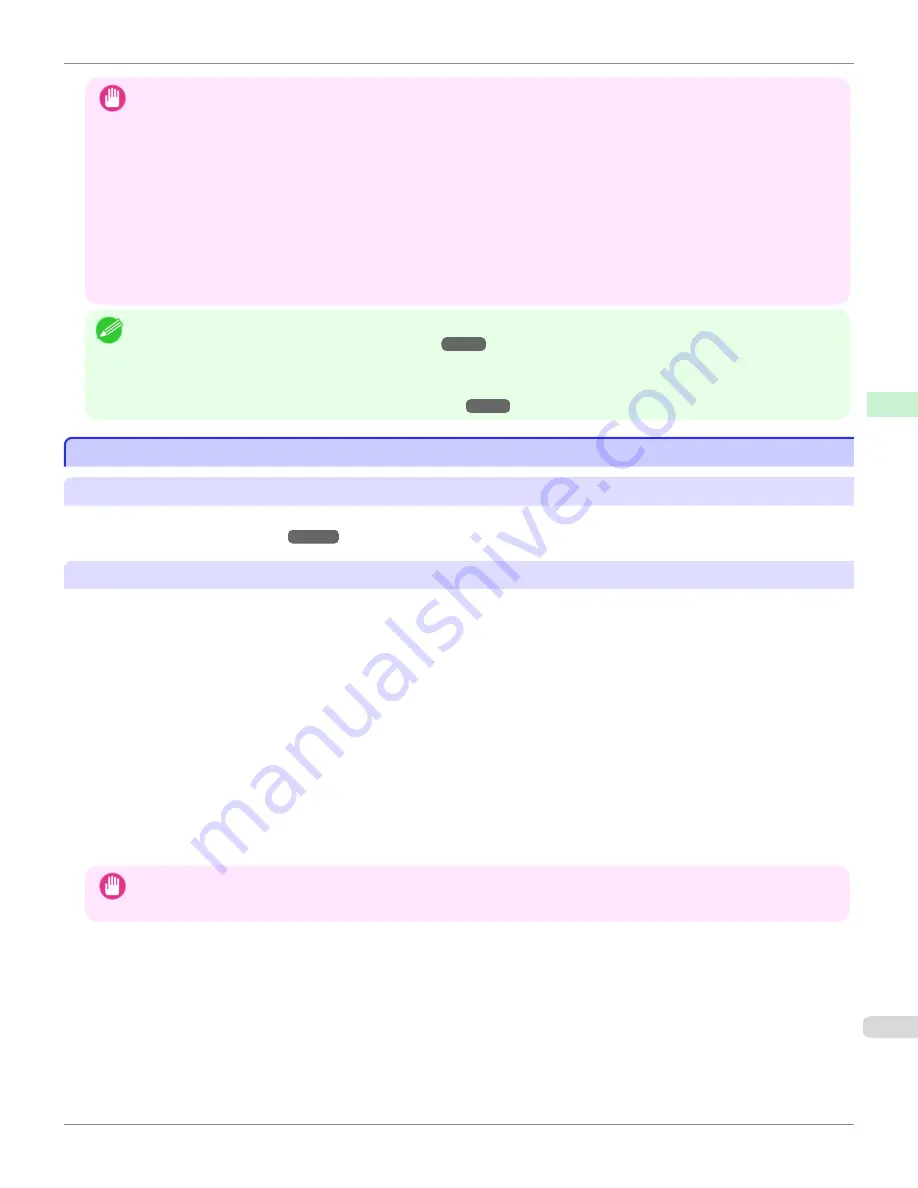
Important
•
When adding custom paper, designate a computer for managing paper in advance and always add custom paper from that
computer. To use that custom paper on other computers, first export the Custom Media Information File (.am1 file) for that
custom paper from the computer for managing paper, and then import it into another computer for use.
•
To use a Custom Media Information File (.am1 file) created outside of the network where the target printer is being used, first
import it into the computer for managing paper. If you also want to use it on other computers, import and use a Custom
Media Information File (.am1 file) newly exported from the computer for managing paper.
•
When importing a Custom Media Information File (.am1 file) that was created on the computer for managing paper, first
delete custom paper that does not exist on the computer for managing paper.
•
When deleting custom paper, make the same changes on all of the other PCs that use the target printer.
•
When using custom paper in another printer, always add the custom paper to that printer before use.
Note
•
Canon genuine paper and feed confirmed paper cannot be changed from this dialog box. Refer to
"Editing Media Type Infor-
mation for Genuine Paper and Feed Confirmed Paper"
➔
P.594
.
•
Changing the display order of media types displayed in the printer control panel and printer driver is performed from the
Edit
Media Types
dialog box regardless of whether it is Canon genuine paper or custom paper. Refer to
"Editing Media Type
Information for Genuine Paper and Feed Confirmed Paper"
➔
P.594
.
Compatible Paper
Compatible Paper
Paper specifications
Refer to "Specifications" and "Paper" for specifications such as thickness and size of paper that can be added as cus-
tom paper
(See "Specifications.")
➔
P.980
Notes on the operating environment
In low humidity environments (below 40%), your printer may develop the following problems.
•
Paper becomes curled or wrinkled.
•
Paper and the printhead are more likely to touch each other, resulting in a scratched print surface or damaged
printhead.
•
The cut printed matter sticks to the printer and will not fall down (film media).
•
Paper sticks to the printer, making its transfer impossible and preventing its normal ejection (film media).
•
Uneven printing (film media)
In high humidity environments (over 60%), your printer may develop the following problems.
•
Printed matter will not dry.
•
Wavy paper surface
•
Cut edges are ragged (fabric media).
•
Margins remain due to borderless printing.
Important
•
Canon offers absolutely no guarantees regarding the print quality or paper feed properties of customer paper (paper that is
not Canon genuine paper or Canon feed confirmed paper).
iPF8400S
Compatible Paper
User's Guide
Handling and Use of Paper
Media Configuration Tool (Mac OS)
607
Summary of Contents for imagePROGRAF iPF8400S
Page 344: ...iPF8400S User s Guide 344 ...
Page 494: ...iPF8400S User s Guide 494 ...
Page 620: ...iPF8400S User s Guide 620 ...
Page 704: ...iPF8400S User s Guide 704 ...
Page 782: ...iPF8400S User s Guide 782 ...
Page 918: ...iPF8400S User s Guide 918 ...
Page 952: ...iPF8400S User s Guide 952 ...
Page 978: ...iPF8400S User s Guide 978 ...
Page 992: ...WEEE Directive iPF8400S User s Guide Appendix Disposal of the product 992 ...
Page 993: ...iPF8400S WEEE Directive User s Guide Appendix Disposal of the product 993 ...
Page 994: ...WEEE Directive iPF8400S User s Guide Appendix Disposal of the product 994 ...
Page 995: ...iPF8400S WEEE Directive User s Guide Appendix Disposal of the product 995 ...
Page 996: ...WEEE Directive iPF8400S User s Guide Appendix Disposal of the product 996 ...
Page 997: ...iPF8400S WEEE Directive User s Guide Appendix Disposal of the product 997 ...
Page 998: ...WEEE Directive iPF8400S User s Guide Appendix Disposal of the product 998 ...
Page 999: ...iPF8400S WEEE Directive User s Guide Appendix Disposal of the product 999 ...
Page 1000: ...iPF8400S User s Guide 1000 ...
Page 1003: ...1003 ...
















































